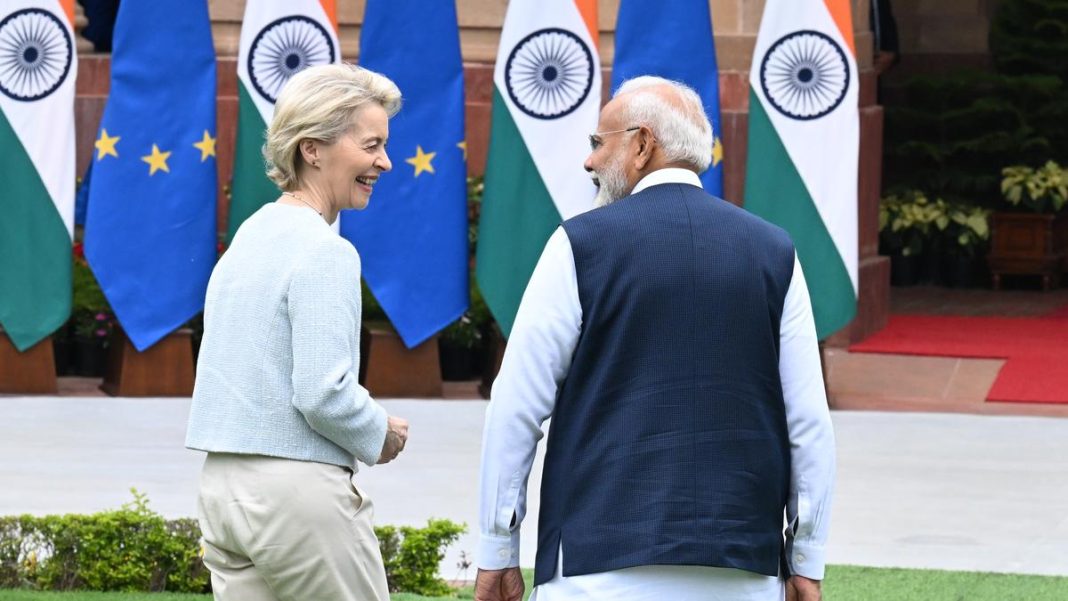India-EU Trade Deal: Officials Confident of Year-End Agreement
Indian and European Union officials express strong optimism about finalizing a comprehensive free trade agreement by December 2025, following the conclusion of the 14th round of negotiations in Brussels.
Key Takeaways
- Both sides target December 2025 deadline for FTA conclusion
- Bilateral trade reached €120 billion in 2024
- Critical issues include CBAM, sustainability, and market access
- Next round scheduled for New Delhi in November
“I can’t imagine a scenario where we’re not close to or have not concluded the FTA at the end of the year,” an unnamed EU official told The Hindu.
Negotiation Teams and Leadership
Commerce Secretary Rajesh Agrawal, who recently assumed his position on October 1, participated in the Brussels talks before departing on Friday. With his new role, Darpan Jain will lead India’s negotiations with the US, though Agrawal maintains oversight.
The Indian EU negotiation team, headed by L. Satya Srinivas, plans to leave Brussels on Saturday. While another formal round is planned for November in New Delhi, discussions will continue between official meetings.
Challenges and Sticking Points
Despite robust trade volumes reaching €120 billion ($139 billion) in 2024, significant hurdles remain. Both parties have identified tariff and non-tariff barriers across multiple sectors including services, agriculture, dairy, pharmaceuticals, automobiles, wines and spirits.
The most sensitive issues have been temporarily set aside from current negotiations. Prime Minister Narendra Modi and European Commission President Ursula von der Leyen established the year-end deadline during their February meeting.
Carbon Border Tax Controversy
India continues to oppose the EU’s Carbon Border Adjustment Mechanism (CBAM), scheduled for full implementation on January 1. Commerce Minister Piyush Goyal has repeatedly warned that India would retaliate if its exports face this carbon tax.
In a recent New York speech, Goyal described CBAM as a “trap” that could isolate Europe and drive inflation. New Delhi also objects to linking climate action with trade agreements.
As of Friday afternoon, CBAM and sustainability matters remained under active discussion, according to sources familiar with the negotiations.
EU Perspective and Compromise Needed
Chief EU Negotiator Christophe Kiener told the European Parliament’s trade committee that the bloc must adjust its sustainable development approach to reach an agreement “something India can live with.” He acknowledged that while the 13th round in New Delhi didn’t yield progress, it improved mutual understanding.
“Towards the end of such negotiations things are bound to be difficult,” Kiener noted. The EU has also raised concerns about India’s Quality Control Orders.
Diplomatic Optimism
Indian Ambassador to Brussels Saurabh Kumar remains positive about the talks’ prospects.
“Trade negotiations by definition are not easy and there are difficulties, but both sides are committed to it and determined to complete it,” Kumar stated, emphasizing the “strong political directive to complete discussions by December.”
Commerce Minister Goyal is expected in Brussels later this month for further discussions.
IMEC Corridor Developments
Beyond trade negotiations, Brussels hosted a ‘Sherpa’ meeting for the India Middle East Europe Economic Corridor (IMEC). Deputy NSA Pavan Kapoor represented India virtually at the steering committee meeting.
With recent ceasefire developments between Israel and Gaza, the EU shows renewed enthusiasm for the infrastructure project announced at the 2023 G20 Summit in New Delhi. The corridor would establish transport, fiber optic, and energy connections from India to Europe via West Asia.
“We are very keen on it, and the Indians are very keen on it, as are others. The key thing is the Middle East being sorted out,” the EU official commented, stressing the continued importance of US involvement: “We need the oomph of the Americans as well.”
Ambassador Kumar confirmed no fundamental obstacles block IMEC’s progress, noting participating nations are currently organizing implementation responsibilities.




